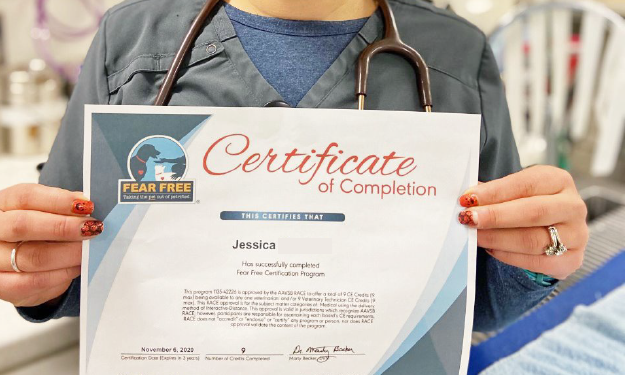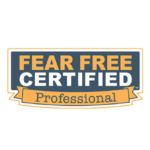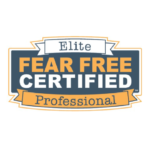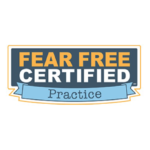What is a Fear Free Certification?

Written By: Victoria DiMeglio, ER/ICU Veterinary Technician
What Is Fear Free?
Fear Free® is an online and in-person program to educate people about caring for the physical and emotional well-being of pets. It is offered to veterinary staff, pet professionals (kennels, groomers, trainers), shelters, and pet owners.
According to their website, Fear Free’s mission is to “prevent and alleviate fear, anxiety, and stress in pets by inspiring and educating the people who care for them.” As veterinary professionals, we have the opportunity to go through an 8-module online course, earning the “Fear Free Certified Professional” title which is valid for 3 years.
At the AAHA conference, Dr. John Talmadge discussed that “Fear Free is all about creating an environment that helps reduce the feelings of fear, anxiety, and stress in our patients by promoting a considerate approach and gentle control techniques in a calming environment; which results in an experience that is much more rewarding and safe for our patients, our clients, and the entire veterinary health care team.”
What Does Fear Free Look Like at the Vet?
Having veterinary team members who are Fear Free Certified is hugely beneficial. The course teaches us a great deal on putting the emotional needs of the pet first through our actions and setups. This can look like:
- Using non-slip surfaces in rooms and treatment areas
- Calming pheromones & aromatherapy
- Soothing music
- Providing hiding areas for cats
- Quiet rooms & distracting toys/treats for nervous dogs
- Intentional scheduling
- Multiple entry points into the office & more!
By using this approach with our patients, we apply a feel-good sensory experience for your pets – focusing on pleasant sights, sounds, smells, taste and touch.
It’s also about better communication about potential triggers for your pet and creating a “report card” specific to your pet and their needs.
Fear in our patients leads to trauma and discomfort which will in turn lead pet owners to visit vets less often and some not at all. Thus, every interaction between the pet, their owner, and clinic staff becomes intentional. We apply the “considerate approach” which encompasses the interaction between the veterinary team and the patient.
How Fear Free Affects Your Pets
Especially in emergency medicine, we understand that when your pet is in pain, they may react fearfully during their examination. This can result in the masking, or even worsening, of their symptoms. Fear, stress, and/or anxiety (FAS) can lead to elevated adrenaline or cortisol levels in pets. After long-term exposure, this can cause immunosuppression, delayed wound healing, ulcers, inflammatory bowel disease, muscle wasting, and the progression of behavior disorders.
According to Fear Free’s overview, those who are certified will:
- “Reduce or remove anxiety triggers that can cause pets to become fearful at home, in transport, and at the veterinary hospital.
- Help owners deliver calm pets to our hospital.
- Enhance the quality of medicine in our practice.
- Increase compliance.
- Improve safety for the veterinary team.”
By utilizing the report card and FAS scale for dogs and cats, we can treat our patients better and give them a much happier and less stressful experience at the vet. Data indicates that the Fear Free approach has improved clinics’ ability to help 90% more of its patients, including fractious cats that could barely be handled before.
Moving Forward At VERC and Our Ethos Locations
Because VERC values our clients’ and patients’ experience, we have begun the process of certifying our full staff. This encompasses our customer service representatives, assistants, technicians, and doctors. Similar initiatives are being carried out at all our Ethos hospitals across the country.
As more of our staff becomes certified, our hospitals will move in the direction of becoming entire Fear Free Certified Practices.
Pathway To Fear Free Practice
- Become a Fear Free Certified® Professional after completing the online 8 module program.
- The opportunity to become Elite after 3 years of being a Fear Free Certified Professional.
- 25% of staff have active memberships & are Fear Free Certified, including 50% + 1 of the full-time veterinarians.
Moving forward, we will all be held to a higher level of care and concern for pets. By placing an equal importance on the emotional well-being and medical well-being of our patients both in and out of our hospitals, we’re helping change the stigma around fear at the vet.


